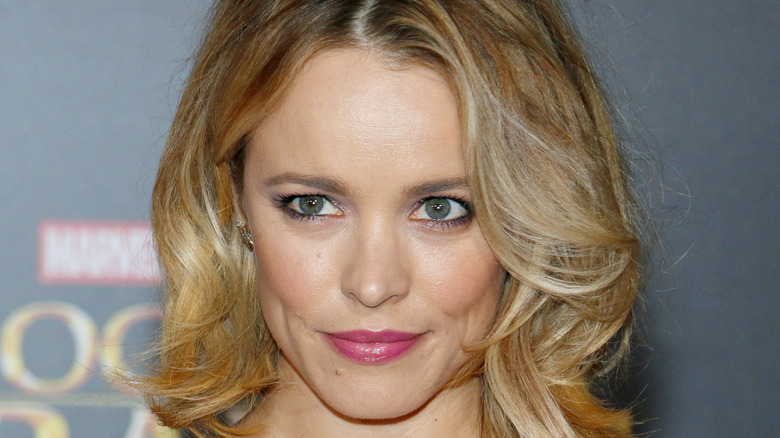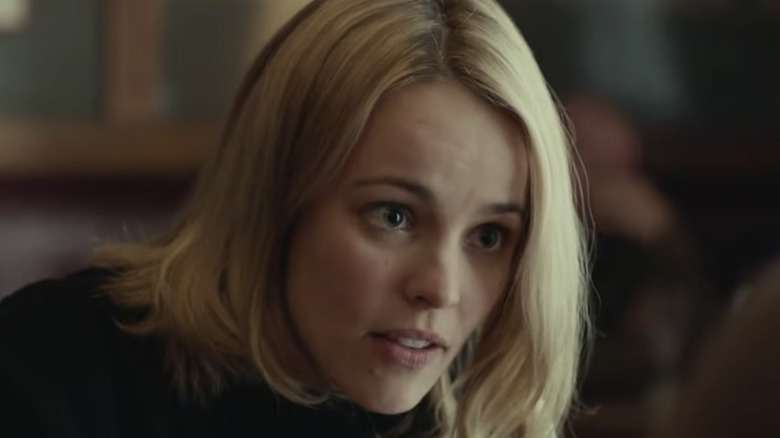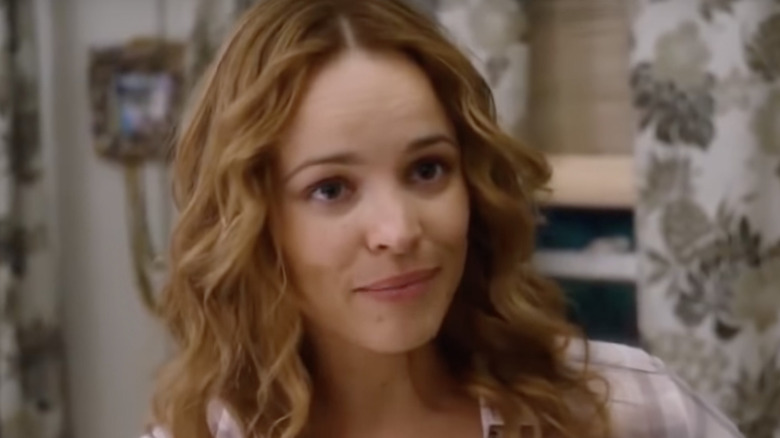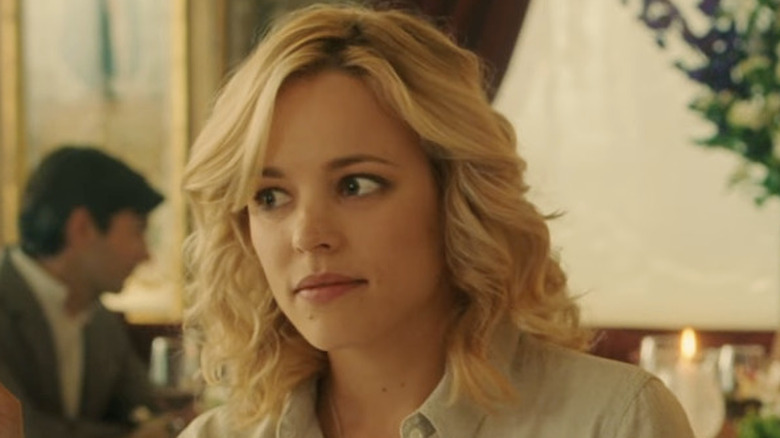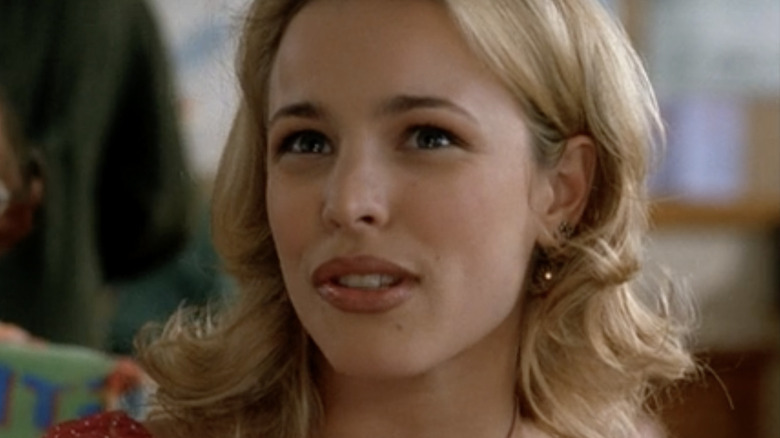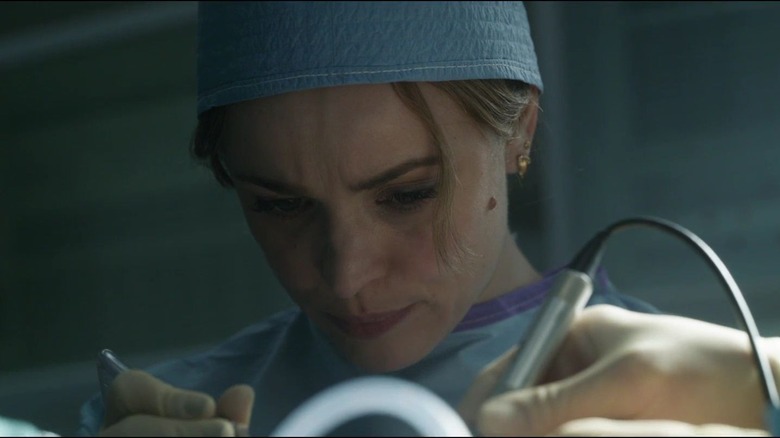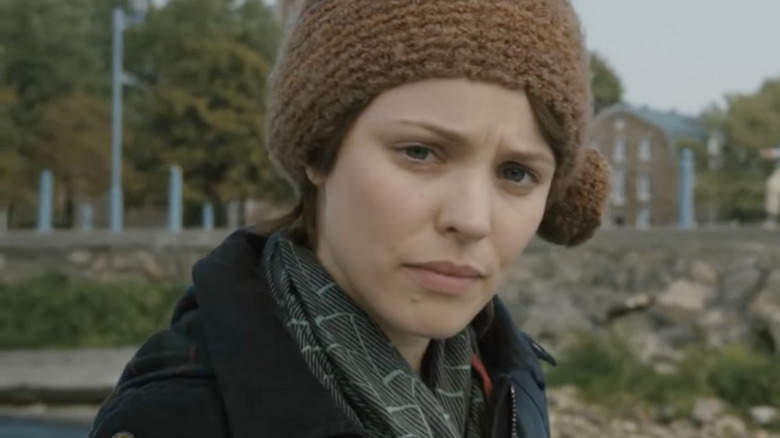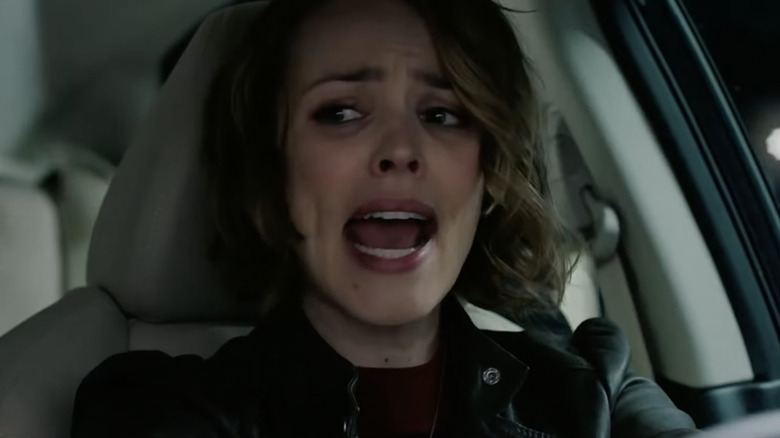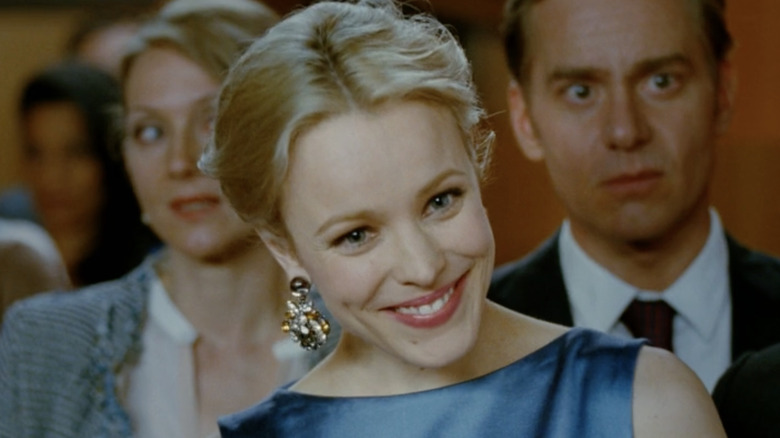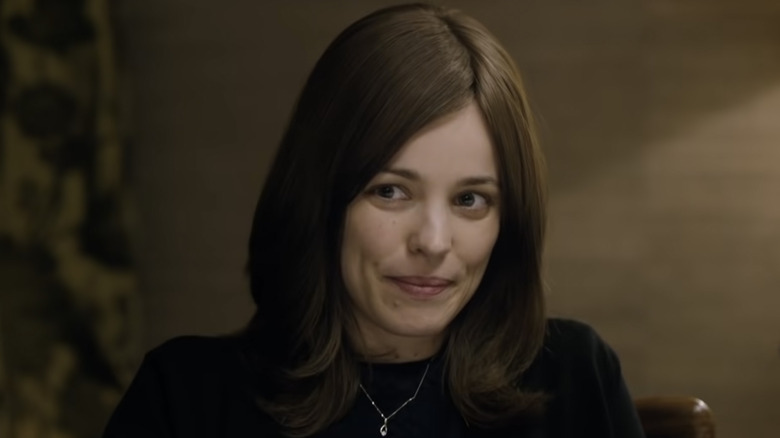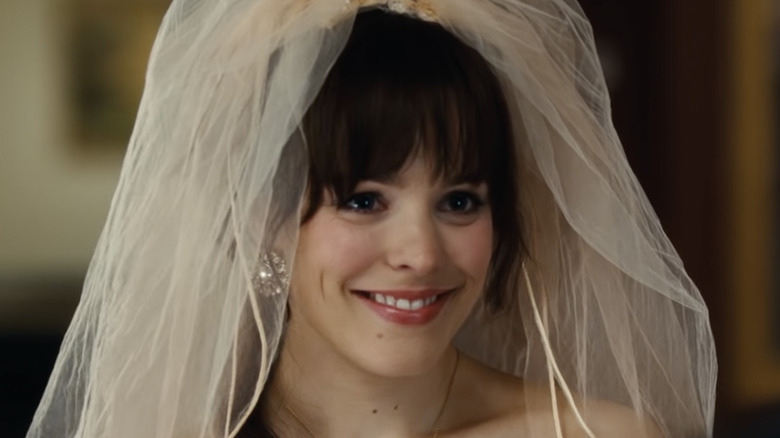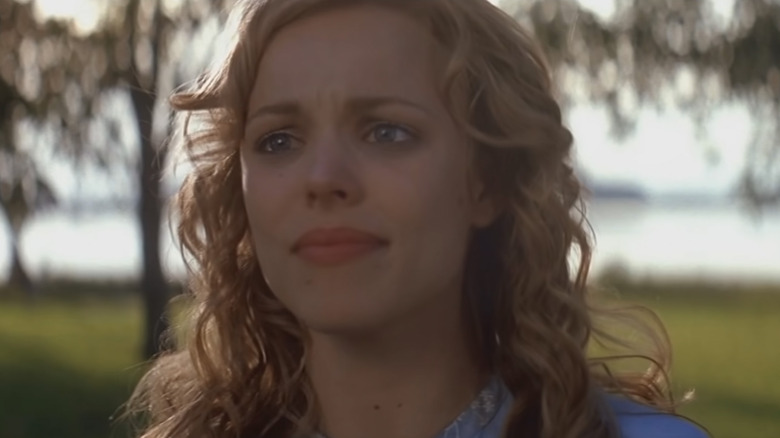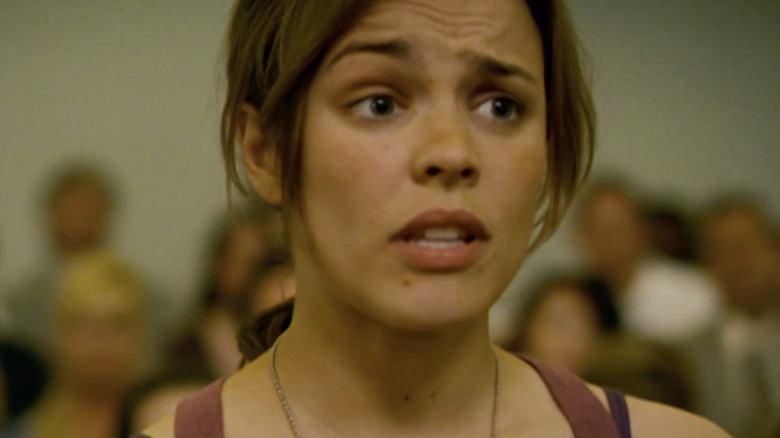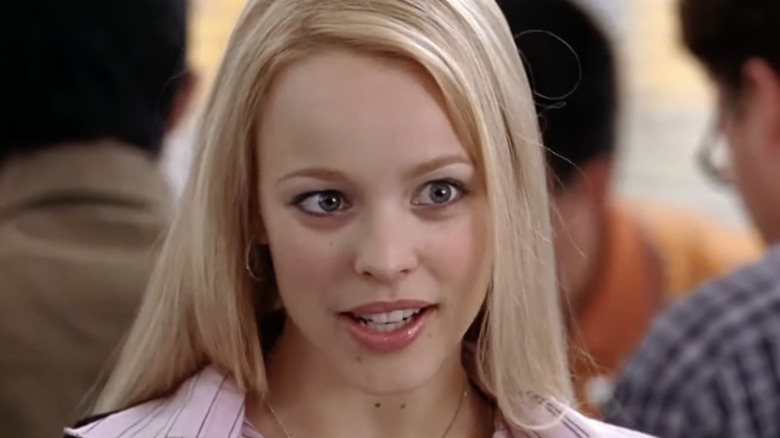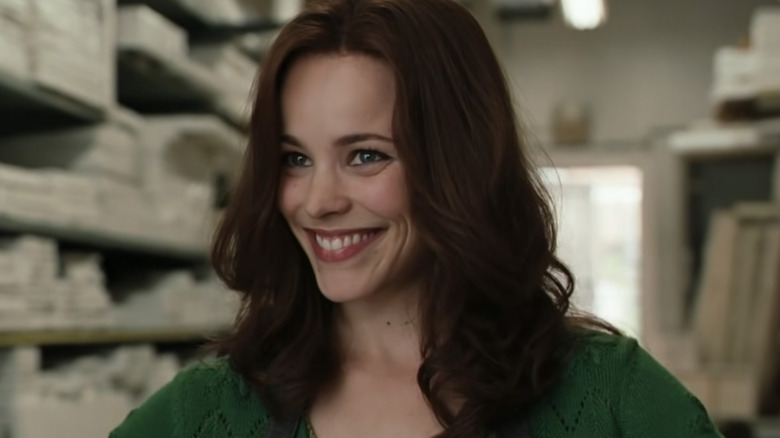The 7 Best And 7 Worst Rachel McAdams Movies Ranked
Rachel McAdams is the kind of actress who elevates every movie she's in. She hit the ground running not long after she started out, making a huge splash in "Mean Girls" and "The Notebook" in 2004, just three years after her on-screen debut in an episode of the Disney Channel's "The Famous Jett Jackson." Since that seminal year, she's gone on to star in everything from thrillers to funny feel-good films to Oscar-winning dramas, and the characters she takes on have been as varied as the films.
Luckily for her fans, McAdams has good taste about the projects she works on. Her sharp sense of what's worthwhile and what isn't has given her a top seven movies any actress would be happy with ... and a bottom tier that's still often pretty enjoyable in its own right. Even though we have to acknowledge the occasional dud in her filmography, it's usually easy to see what drew her in: Who wouldn't risk a possible flop for the chance to, say, work with a legendary director like Brian DePalma? So, let's take a look at the best and worst the career of Rachel McAdams has to offer.
Best: Spotlight
"Spotlight" offers a window into long-term investigative journalism and makes a powerful argument for why society needs it. In this dramatization of a true story, new Boston Globe editor Marty Baron (Liev Schreiber) asks the newspaper's unit of investigative reporters to look into allegations that the Catholic Church leadership is covering up cases of abuse. To everyone's shock and horror, the truth they uncover shows that the problem is much older and much more widespread than they ever suspected.
As The LA Times' Kenneth Turan wrote, "'Spotlight' doesn't call attention to itself. Its screenplay is self-effacing, its accomplished direction is intentionally low key, and it encourages its fistful of top actors to blend into an eloquent ensemble." It's a moving, subtle study not only of the scandal at its core, but also of cultural and personal blindspots, journalistic ethics, and how people deal with weighty revelations. With all its layers and delicate character work, it's not surprising that "Spotlight" took home Academy Awards for Best Picture and Best Original Screenplay.
The film's well-developed ensemble means no one actor takes center stage, but Rachel McAdams has a prominent role as reporter Sacha Pfeiffer. Her intellectual sharpness and persistence make her an obvious asset to the Spotlight team, and McAdams is always good at portraying someone with this kind of skilled, self-assured professionalism. Where she really shines, though, is in Sacha's crisis of faith, as the story she's following chips away steadily at her trust in the Church.
Worst: Aloha
"Aloha" is probably best remembered for its misstep in casting Emma Stone as a character who is a quarter-Chinese and a quarter-Hawaiian. It was an incidence of whitewashing that drew considerable attention and criticism even at the time, according to The Hollywood Reporter. Since then, Emma Stone has noted that she regrets taking the role. The movie itself has mostly vanished from the pop culture consciousness — and good riddance to it.
Its story awkwardly combines a muddled plot of cultural and geopolitical importance with the story of one man's redemption and love life. Brian Gilcrest (Bradley Cooper) visits Hawaii to pave the way for a privately funded space center. He's drawn to his military liaison, Captain Allison Ng (Emma Stone), but their budding romance risks being overshadowed by ongoing longing and secrets with his ex-girlfriend, Tracy (Rachel McAdams).
Critics panned the film, with publications like The Guardian noting how the movie smooths out all its potential conflicts and never really convinces us that Gilcrest is really washed-up or vulnerable. "Aloha" is constructed in such a slipshod manner that we have to deem it McAdams' worst movie.
But while it has plenty of problems, her performance actually isn't one of them. "Hero's ex" is usually a thankless role, but McAdams imbues Tracy with realism and warmth. While we're watching her deal with her rocky marriage and her past with Gilcrest, we can briefly believe this is a better movie than it is.
Best: Midnight in Paris
"Midnight in Paris" is a pleasing, low-key time travel fantasy with a dash of bittersweet romance. The wistful Gil Pender (Owen Wilson) is trapped in a joyless Parisian vacation with his fiancée, Inez (Rachel McAdams). Gil loves Paris, but we can tell that he would rather be seeing it with anyone else. He and the success-driven Inez have nothing in common, and she can only roll her eyes at his passion for the thriving literary and artistic scene in 1920s Paris: Why cling to a world that vanished almost 100 years ago?
A surprise midnight miracle, however, offers Gil a door into the 1920s and introduces him to all his idols: Ernest Hemingway, F. Scott Fitzgerald, Gertrude Stein, Cole Porter, Josephine Baker, and Picasso. By day, Gil stays in the present with Inez, where their relationship continues to deteriorate, but by night, he lives his dream and romances costume designer Adriana (Marion Cotillard). Sooner or later, he'll have to choose which time he wants to truly belong to.
"Midnight in Paris" is full of scene-stealing actors — Tom Hiddleston, Adrien Brody, Kathy Bates, Allison Pill, Marion Cotillard, and Corey Stoll, to name a few — whose larger-than-life roles made critics marvel. Against that background, and with Owen Wilson firmly in the starring role, it's hard for Rachel McAdams to get much time to shine. It doesn't help that Inez is a flat and hard-to-like character. Nevertheless, her work here didn't go unnoticed, and she collected a Satellite Award nomination for the film.
Worst: The Hot Chick
Not even the most devoted of Rachel McAdams fans should feel the need to seek out 2002's "The Hot Chick," a faux-comedic pile-up of inept plotting and offensive and unfunny "jokes." Watching it is an exercise in feeling your mind slowly go numb.
Jessica (Rachel McAdams) is a classic high school mean girl — and while the immortal Regina George proves that McAdams can make a mean girl character fascinating, there's only so much she can do with a role written to have this little wit or verve. In any case, she's not playing Jessica for long, because magical earrings lead to her accidentally swapping bodies with bottom-of-the-barrel thief Clive (Rob Schneider).
"The Hot Chick" ran cold with the critics, with The Austin Chronicle noting that Rob Schneider's fans may find something to like here, but "the humor is definitely low-brow, and the movie's sex-switch hook is mined solely for physical gags ... one might expect that with such low goals the film might have at least hit its target more often than it does."
In the end, McAdams simply doesn't have enough to do here. She's just stuck playing second fiddle to Schneider, and it's all a big waste of her exceptional comedic talents.
Best: Doctor Strange
With its unique visual pyrotechnics, a thoughtful script, and breathtaking reality-bending, "Doctor Strange" adds a delightful and critic-pleasing dash of philosophy and pure, trippy weirdness to the Marvel Cinematic Universe. Benedict Cumberbatch stars as Dr. Stephen Strange, an ultra-arrogant surgeon whose complacent life is shattered when his hands — the key to his talent and livelihood — are seemingly irreparably damaged. In an effort to shake the persistent tremors and get his life back, Strange chases down a "miracle cure" that turns out to be a magical one. The trail leads him to Kamar-Taj, where he studies and slowly masters mystical, inter-dimensional forces.
Stunningly cool visuals, a charismatic and flawed central character, a rich supporting cast, and one of the best ultimate villain showdowns in the MCU all rightly earned "Doctor Strange" its acclaim. It's a film that's easily worth watching and rewatching — and many of its actors returned in the 2022 sequel, "Doctor Strange in the Multiverse of Madness."
Rachel McAdams plays Christine Palmer, Strange's colleague and one-time lover. McAdams and Cumberbatch have great chemistry as settled, friendly exes who still have a deep — if undefined — regard for each other. As Peter Debruge wrote for Variety, McAdams is "the most competent — and human — of Marvel's window-dressing girlfriends." It's a small role, but McAdams gives Christine an effortless gravitas that lets us immediately understand that if she can love Strange, there's more to him than first meets the eye.
Worst: Every Thing Will Be Fine
Director Wim Wenders has helmed a number of acclaimed films, from "Paris, Texas" to "Wings of Desire" to the documentary "Buena Vista Social Club." Considering his string of successes, we can understand why Rachel McAdams signed on to his 2015 film "Every Thing Will Be Fine." Unfortunately, this flop left audiences unmoved and critics profoundly disappointed.
While this movie preserves Wenders' gift for stunning visuals, it fails to tell a compelling story despite having the right material for one: Tomas Eldan (James Franco) accidentally hits a boy with his car, and he must find a way to crawl out of his guilt and grief, so he can move forward and provide some real assistance to the boy's family. It could make for a quietly wrenching drama, but it just feels strangely lifeless, stilted, and monotonously glum.
McAdams does her best with her supporting role as Tomas' ex, Sara, but the role doesn't offer the best showcase for her talents. It affords her no opportunity to stretch herself and, as Variety pointed out, it falls into an unfortunate pattern: "Poor McAdams, sporting sensible hair and a truly mystifying cod-Continental accent, continues her thankless run of needy, tossed-aside love interests in big-name auteur projects."
Best: Game Night
Max (Jason Bateman) and Annie (Rachel McAdams) love games, from trivia nights to Pictionary. But they get in over their heads when Max's older, more successful brother Brooks (Kyle Chandler) comes to town. Max has been one-upped by Brooks his whole life, and he's determined to win the elaborate "find the hostage" role-playing game Brooks has organized for them. He's just missing a key piece of information: This kidnapping is all too real.
"Game Night" packs in plenty of surprises, irresistible quotes, and delicious bits of pay-off, all of which made it a critical hit. While most comedies would settle for coasting on this kind of high-concept premise, "Game Night" doubles down to make the absolute most of it. Empire sums it up well: "It boasts a witty, razor-sharp screenplay and a fleshed out story ... [as well as] characters you'll care about."
Bateman and McAdams make Max and Annie a couple you can get completely get behind, whether they're hashing out if they should have kids or whether Max is biting down on a dog's chew toy while Annie tries to dig a bullet out of his arm. McAdams has arguably never been funnier than she is in "Game Night," and even The New York Times' Glenn Kenny, who was lukewarm on "Game Night" as a whole, sang her praises, calling the film "a pointed reminder that Ms. McAdams is one of cinema's most accomplished and appealing comic actresses."
Worst: Passion
Brian De Palma's 2012 erotic thriller "Passion" falls on the lower end of Rachel McAdams' filmography, but De Palma's distinctive style lends flair to this remake of the 2010 French-language "Love Crime." In the end, though, it basically defines "mixed bag," and rocky critical reviews show that while the disappointment wasn't universal, it was still fairly widespread.
Christine (McAdams) and Isabelle (Noomi Rapace) are professional rivals, who work together at an ad agency. From a distance, it looks like Christine is mentoring her younger associate Isabelle — but once you scratch the surface, you discover that their relationship seethes with resentment and personal and professional jealousy. Isabelle makes a costly misstep when she goes behind Christine's back to make sure she gets credit for her work. Christine, who wanted to present it as her own, is livid, and she'll stop at nothing to pay Isabelle back for stealing the spotlight. Then this twisted tale of revenge soon takes a surprising turn ....
While "Passion" is disastrously uneven, we can easily get why McAdams and Rapace were drawn to the project: Christine and Isabelle are the kind of vivid and challenging characters actresses don't get the chance to play all that often. NPR even credited McAdams' performance as a highlight, saying, "McAdams in particular does a fine job as the cold Christine, relishing the cutthroat viciousness of her lines." We wind up relishing it too.
Best: Disobedience
Religion, societal pressures, desire, and sense of self all collide in the subtle but powerful "Disobedience," where Rachel Weisz stars as Ronit Krushka, who must return to the Orthodox Jewish community she left in order to attend her father's funeral.
Her visit soon brings up old feelings and memories, especially between her and her old friend Esti (Rachel McAdams), who stayed in the community and married their childhood friend Dovid (Alessandro Nivola). Ronit and Esti are drawn to each other, and the sexual and romantic tension between them only highlights how little desire there is in Esti's marriage.
"Disobedience" is equally successful as both drama and romance. It handles its characters with empathy and care, allowing them plenty of nuance and many opportunities to grow, which made it resonate with the critics. While Weisz has a slightly more central role, Esti's arc of struggle and self-acceptance gives McAdams rich, emotional material to work with. She and her co-stars are completely convincing, with Empire saying, "The performances from Weisz, McAdams and Nivola are faultlessly nuanced, anchoring the film with a frank sincerity that gives 'Disobedience' a heartfelt realism." Between that and the exceptional quality of the film overall, this ranks among McAdams' best work.
Worst: The Vow
"The Vow" attempts to recapture what made audiences fall for "The Notebook," but this time around, the magic just isn't there. Paige (Rachel McAdams) survives a car crash, but when she wakes up from her coma, she's lost all memory of her marriage to sweet, hunky Leo (Channing Tatum). The last few years are now a complete blank, and she's left with a lot of questions that aren't easily answered. While Paige flirts with diving back into the life she can remember — including her one-time fiancé, Jeremy (Scott Speedman) — Leo hopes against hope that she'll come back to him and that they'll be able to recapture what made their relationship so special.
We like a good amnesia story as much as anyone, but "The Vow" plays it a little safe. Roger Ebert criticized it for that sanitized quality, writing, "It's all too painless. One can imagine the anguish of the case in real life. ... 'The Vow' never really grapples with [its] issues. It's pleasant enough as a date movie, but that's all." Fortunately, while it's not a good movie, McAdams is good in it, and she gets a substantial starring role here. It's a shame she's not allowed to bring anything rawer or more difficult to the table, but she shines even in this glossy, overly sweet version.
Best: The Notebook
"The Notebook" may not have been too successful with critics — although it still had its notable defenders, like Roger Ebert, who said that McAdams "shows such beauty and clarity that we realize once again how actors are blessed by good material" — but its sincerity, passion, and bittersweetness helped make it a massive hit with audiences. We know we still melt for that kiss in the rain. When you can sell that kind of swoon-worthy moment, and when you have a lead couple with this much star power, audiences will always be eager for more.
As Noah and Allie, Ryan Gosling and Rachel McAdams win, break, and heal our hearts (with excellent support from James Garner and Gena Rowlands, who play their older selves). When the two first meet in 1940, they have a sweet and deeply felt romance, but class tensions soon get in the way: Allie's well-to-do, traditionalist parents aren't too happy about the prospect of their daughter marrying a blue-collar worker. Eventually, however, their obvious love for each other wins out over all other considerations — until, after years of marriage, dementia begins to steal Allie's memories.
"The Notebook" is an earnest, effective tearjerker that's a guaranteed crowd-pleaser and a favorite among romance fans. It also represented an especially strong career move from McAdams: The one-two punch of "Mean Girls" and "The Notebook" coming out in the same year shows off her impressive range.
Worst: The Lucky Ones
Road trip movies are typically rambling and episodic, and that means they're at risk of becoming too disjointed and baggy. Unfortunately, "The Lucky Ones" slips too far on the wrong end of that scale.
Its poor structure and constantly fluctuating tone don't serve it well, but it's grounded by a trio of strong performances from Rachel McAdams, Tim Robbins, and Michael Peña. Robbins plays a staff sergeant looking at retirement, while McAdams and Peña play younger soldiers temporarily home on leave. They all return to the United States with their own missions, but when circumstances force them together, they quickly develop a ride-or-die mutual loyalty.
Most critics weren't fans of the film's plot and structure, but many did agree that McAdams, Robbins, and Peña were all notably great here both individually and in their ensemble. Laura Kern noted for The New York Times that "the lead actors work so well together, adding depth and levels of vulnerability to fairly underwritten roles," and that McAdams in particular was "luminous as always."
This is a particularly good part for McAdams, whose PFC Colee Dunn covers a wide emotional range, demonstrates a lot of heart, and goes through plenty of ups and downs. McAdams is always good at on-screen rapport with her co-stars, and "The Lucky Ones" is a high even for her. It's just a shame that all of that isn't in service to a better or more coherent movie.
Best: Mean Girls
Whether we're wearing pink on Wednesdays or trying to make "fetch" happen, some part of us is always basking in how much we still love "Mean Girls," a bona fide millennial classic. The story of how innocent home-schooled Cady Heron (Lindsay Lohan) enters high school for the first time and winds up getting drawn into a plot to destroy cruel, petty queen bee Regina George (Rachel McAdams) is basically engraved on our hearts at this point. The movie has a spectacular cast, bright and colorful visuals, a strong message, and more quotable lines than we can count, which made it beloved by both critics and audiences alike.
Best of all, it has Rachel McAdams as Regina George. Maybe she's not technically the star, but she absolutely burns with star-power here, and she lifts Regina George out of the ranks of a thousand movie mean girls and into a realm of her own. The Telegraph understandably singled her (and her character) out, saying, "The film's fizziest performance comes from McAdams as Regina, a blonde with the body of a supermodel and the mind of a KGB chief." She's cutting, withering, scheming, vindictive, reluctantly human, and powerfully charismatic, and McAdams plays it all to the hilt. It's an iconic performance in an iconic film, which means "Mean Girls" rounds out our list of McAdams' top seven movies.
Worst: The Time Traveler's Wife
In 2009, Audrey Niffenegger's hit novel "The Time Traveler's Wife" received this middle-of-the-road adaptation starring Rachel McAdams and Eric Bana as Clare and Henry, a couple who experience their romance out of order due to Henry's uncontrollable time traveling. Clare's life has been shaped by Henry's enigmatic out-of-time visits, and she's known since childhood that they would marry someday. Their eventual life together may be full of bittersweet time travel paradoxes, but they do their best to love and hold onto each other.
This is a tricky film to anchor, since it's easy for the audience to get distracted by both logistical questions and more awkward moral ones, like, "Even if he didn't do it on purpose, isn't it a little creepy that adult Henry basically molded this child to become his ideal future wife?"
The Hollywood Reporter gave the movie considerable credit as an adaptation, noting that "the heart of [Niffenegger's] time-leaping romance remains intact while all its superfluous details and rudderless characters are jettisoned," but also acknowledging that "it still is an acquired taste as illogic often trumps emotions and, for some at least, the treacle comes on a little too strong toward the end." Nevertheless, the film claws its way to watchability on the merits of McAdams' and Bana's performances, which sell us on the nearly hypnotic pull Henry and Clare feel towards each other. This is definitely one of McAdams' lesser films, but it's only weak, and not out-and-out bad.
